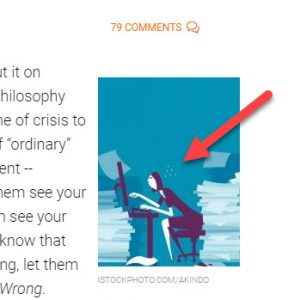Inside Higher Ed Can Fuck Right Off…
How the Academic Insider Publication is Continuing its Long Tradition of Attacking Women

I am writing this blog post during my video office hours. This is what I look like.

Two students have already popped in with questions. I have not showered and I am wearing a track jacket. I have no makeup on. My nails are a mess. My gray roots are popping through my artificially red hair and I laughed with my students about it yesterday. I’m running out of brow liner. My husband and I have squeezed into the home office he usually occupies alone and there are cables and cords everywhere. That’s where it’s quiet. The piano that our children usually play has become a repository for all of the stuff we need access to do our jobs. Notebooks with ideas. Amazon boxes with equipment for telemedicine and virtual teaching. A pile of jewelry that fell out of the tote bag I usually carry to work. I just noticed that there is a beer bottle on my husband’s desk because finding quiet moments to work means that we have to be flexible enough to work around the clock. He probably had a beer late last night while working on a paper. Poor dude. None of this impacted my ability to effectively answer my students’ questions.
But, why haven’t I showered? In quiet protest against this absolute drivel that Inside Higher Ed published yesterday. Kristie Kiser, self-described student success coordinator for the University of North Georgia and a doctoral candidate in the university’s higher education leadership and practice Ed.D. program offers an argument to support the articles secondary line that “In these trying times, the last thing that students need to see is their professional, highly educated professor falling apart at the seams.” Kiser ends the article with her main point that our appearance dictates our professionalism, writing:
This responsibility is ours, and we must rise to the challenge. Higher education has endured epidemics, wars, recessions, depressions and a plethora of instances of social unrest. We must endeavor to not be the generation that allowed its integrity to crumble as we caved to laziness, disorganization and unprofessionalism.
We can start small. Please wash your hair.
Kristie Kiser is clearly a novice troll and can sit right down. Allow me to describe how this is clearly a blatant, misogynistic attack aimed squarely at women. Even women can fall prey to the patriarchy, particularly women of a particular generation who frequently ask to speak to a manager. Let’s walk through the evidence.
First, let’s look at the featured image:

That’s clearly a female-gendered professor in that picture, looking disheveled. Why would she go after the male professors, anyway? A lot of those guys weren’t showering regularly pre-COVID. Women are the only ones in academia expected to be flawless, regardless of the situation. Men are quirky when they look haggard. Women are unprofessional. Women and, in particular women of color, have had their appearance scrutinized for years as analysis of their fit in the academy. Kiser is now encouraging this to bleed into crisis times. And, many men aren’t particularly disheveled right now, making it clear on places like Twitter that they are expecting to be even more productive than pre-COVID and that they expect us all to do exactly the same. It would be petty of me to write that I googled the author and, I’m not gonna lie, my intra-COVID lewk is far superior to her pre-COVID, professional photoshoot lewk. I’m not that petty, so I won’t write that.
Kiser uses particularly gendered examples of how we’re falling down on the job and her imaginary colleague is, of course, a woman. She writes:
In a world where conversations around us are terrifying, a student who has perceived Dr. Jones as a strong female role model, who is polished and eloquent at all times in the classroom, may be quite alarmed indeed to find Dr. Jones wearing her Pokémon pajamas with disheveled, unwashed hair, lamenting the added workload associated with social distancing. Your piles of unattended laundry are not trophies for the amount of time you are putting into your coursework. They are distractions, signs of disorganization and, quite frankly, unsightly and off-putting. Educators, please rethink your approach to your students. In these trying times, the last thing that they need to see is their adult, professional, highly educated instructor falling apart at the seams.
Having a pile of laundry is not a sign of being disorganized, it’s a sign of wearing clothes and Kristie should thank her lucky stars I’m even wearing pants these days. I’ve got a household of seven and we generate laundry and dishes and dust, even during non-COVID times. Now, I’m doing all of the same stuff plus homeschooling my children. My husband is a physician, busy with the COVID response and less available, and I’m doing my best. Somedays I feel like I’m on the Oregon Trail and we’re all gonna get eaten by wolves if I can’t figure out where to buy toilet paper. I took a conference call in my bedroom closet because my husband needed the office to discuss patients with his colleagues and it’s unethical to let people on my call hear that information. It was the only other quiet place. I think my colleagues understood. I could ask my husband to spend less time on his clinical duties because Kristie is worried that feminism is going to be destroyed by my laundry, or she can be thankful for the sacrifices people like us are making and be a little merciful. Unfortunately, Karens are not known for their mercy.
Here’s the thing about being a professor. When I agreed to educate all the students about whose success Kiser is so concerned, I did not agree to do it in my home. On a normal day, I put on my little professional outfit, go to work, and teach. Then I come home to the private space that is mine. It’s personal and it’s safe. My family is here. My stuff that I like is here. I didn’t agree when I took this job to let my students and colleagues in here. My university is not paying for my WiFi. I didn’t consent to let them in my bedroom closet and my children did not consent to stay silent when I teach. I’m not particularly comfortable with this, but I’m doing this because I really do care about my students. Anyone who Zooms or teleconferences with me right now is a guest in my home and should behave accordingly. Unlike Kristie Kiser, I actually am a strong female role model and I have made the choice to try to support my students and peers. Like Katie Porter, I am not here to suffer anyone’s bullshit.
Lest I be accused of being unclear thus far, I’m going to tell you all exactly like it is. Not as a graduate student and “student success advocate,” but as someone who is actually proving herself to be dedicated to student success. Here’s how I could have responded to COVID. I could have taken FMLA to care for my children. I could have closed my lab completely, left my grad students to fend for themselves for a few weeks, and given my course to another professor. Because it’s unlikely my colleagues would feel comfortable teaching my particular course, my university might have chosen to end it early. It would have been completely ethical and reasonable for me to focus on my family, and my university would have supported me. If anyone else has made that choice, I support it. I am only here because I care about my students and I think I can keep this train from going off the tracks. I’m willing to suffer a little pain and exhaustion because I want them to keep learning. That’s a sacrifice, not the default. I can’t protect my students from the reality of what that means, but I can promise to keep trying to be here for them. The one beacon of hope and light in all of this is, I think my students know I care about their success. I think they’re willing to give me a pass for my graying roots and sometimes disheveled office. I don’t blame them for not forgiving me over the eyebrows. They are a sin. How will they take me seriously without good eyebrows?
To tie a pretty little bow on all of this, here are two things that are exceedingly clear to me.
- Kristie Kiser’s mother or grandmother clearly did not teach her any damned manners. My dearly departed abuela, God bless her soul (sign of the cross), taught me that when you are invited into someone’s home, you show gratitude. You don’t judge them for their home. You’re thankful that someone would invite you to be near their family and share limited resources with you.
- Inside High Ed knows exactly what they’re doing. They wrote this clickbait article, and allowed this woman to pour gasoline on herself and light herself on fire, in order to attract traffic and piss people off. It’s shameful to be trying to hurt people in times of crisis.
Fuck them for having “Diversity” as a tab on their banner page. Insider Higher Ed is no friend to women and they should be lumped in with all of the rest of the predatory, harmful journals I spend most of my life trying to avoid.







Not only is everything you say here true, but the article is also bad education. The byline you quote:
“In these trying times, the last thing that students need to see is their professional, highly educated professor falling apart at the seams.”
Is simply wrong. 25 years ago, when anything I knew was current, the theory of cognitive apprenticeship was well-known; students don’t need to see you produce pristine and shiny solutions out of thin air like magic, they need to see you tackle a real problem, wander down a few false paths, even struggle a little, and watch how you work it out. That doesn’t just apply to your subject matter, it applies to the life lessons on the side. Who could take seriously anyone who didn’t seem profoundly affected by this crisis? So let them see you struggle with this a bit too… and then let them see how you beat it.
I’ve been wearing only pyjamas for 3 weeks, and my hair calls into question the validity of natural selection. (There’s no way any species has ever needed THIS.) My camera is always on the work, not myself, but my students have certainly been able to see the racing car pyjama pants that my mommy sewed for me, whenever my legs come into view. And it clearly hasn’t bothered anyone. We’re just glad that any teaching can still continue at all.
Some of my students are struggling to afford to stay connected, and that’s a far bigger worry. But it’s also a worry most educators are powerless to do much about. Perhaps, for some, this obsession with appearance is just a way to pretend they still have control over the chaos.
Really, if you’re trying to get a degree, the only profs whose looks you need to worry about are in cosmetology. Heck, I get miffed if a company I’m working with has a dress code.
*Applause.gif*
Not only is it misogynist, it’s ableist AF. The fact that I am still FUNCTIONING as an educator despite raging anxiety disorder set off by *waves hands around* all this should be the highlight of my tenure package.
Thank you for this. It is awesome and totally right on.
That article is completely misogynist! Why are women still judged on their physical appearance and adherence to gender stereotypes?
Sadly, I know professorial women for whom Kiser is accurate. These women refuse to let their students see them with a hair out of place. Some of them won’t use the (free) uni gym because they don’t want students to see them “like that,” as though “that” was something shameful. They maintain their professorial persona at all times. They must be exhausted. OTOH, I didn’t care about maintaining any persona. I dressed to adhere to my uni’s dress code (!) and I certainly passed as faculty. Students didn’t seem to care how we dressed. After all, it’s a uni, not a fashion show.
I frequently saw my current and former students in public away from uni. I usually wear sweatpants or shorts and t-shirts and old sneakers; maybe I even combed my hair that day. When I’m in a grocery store, for example, I’m not being a professional. I’m off-duty, so to speak. Until reading Kiser’s nonsense, I never considered my appearance “unprofessional.” I was always glad to see students. Again, they didn’t care how I looked.
I think it’s good for students to see their instructors as relatable. As HUMAN as they are. Isis, your students seeing you discombobulated lets them know that we are all in this together, that we all are affected, and we all are doing the best we can. I think that’s reassuring.